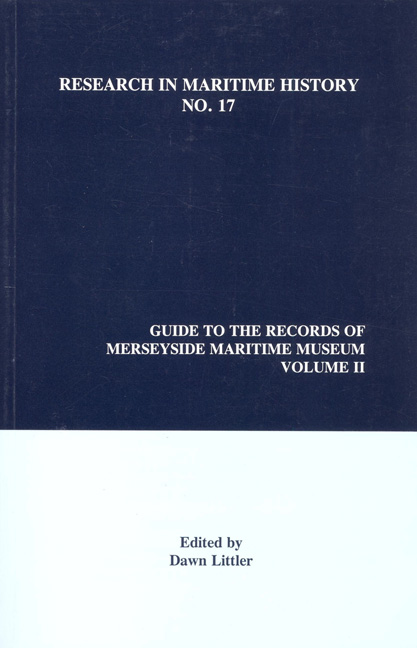Book contents
- Frontmatter
- Contents
- Introduction
- Notes on Access and Use of the Archives
- Acknowledgements
- Notes on the Editor
- List of Illustrations
- Chapter 1 Merchants, Ship Brokers and Agents, Stevedoring and Warehousing Companies
- Chapter 2 Transatlantic Slavery and Slave Trading
- Chapter 3 Emigration
- Chapter 4 Maritime Charities, Missions and Educational Establishments
- Chapter 5 Shipbuilding and Repairing, Engineering and other Maritime Trades
- Chapter 6 Maritime Families
- Chapter 7 Seafarers and Other Individuals
- Chapter 8 Special Collections: Titanic and Lusitania
- Chapter 9 Pictorial and Audio
- Chapter 10 Maritime Library
- Chapter 11 Research, Miscellaneous and Non-Maritime
- Chapter 12 Addenda to Guide, Volume I
- Index
Chapter 1 - Merchants, Ship Brokers and Agents, Stevedoring and Warehousing Companies
- Frontmatter
- Contents
- Introduction
- Notes on Access and Use of the Archives
- Acknowledgements
- Notes on the Editor
- List of Illustrations
- Chapter 1 Merchants, Ship Brokers and Agents, Stevedoring and Warehousing Companies
- Chapter 2 Transatlantic Slavery and Slave Trading
- Chapter 3 Emigration
- Chapter 4 Maritime Charities, Missions and Educational Establishments
- Chapter 5 Shipbuilding and Repairing, Engineering and other Maritime Trades
- Chapter 6 Maritime Families
- Chapter 7 Seafarers and Other Individuals
- Chapter 8 Special Collections: Titanic and Lusitania
- Chapter 9 Pictorial and Audio
- Chapter 10 Maritime Library
- Chapter 11 Research, Miscellaneous and Non-Maritime
- Chapter 12 Addenda to Guide, Volume I
- Index
Summary
Merchants
Merchants played a vital role in the successful development of Liverpool in the eighteenth century. It was usual at this time for merchants to deal in a wide range of commodities and trading areas, and they were often involved in other business interests such as insurance, banking and brokerage, and shipowning and shipbuilding. For example, Bryan Blundell, was a master mariner and merchant engaged mainly in the transatlantic trade and the firm of T. & J. Brocklebank, were merchants as well as shipowners and shipbuilders until 1864. Other Liverpool merchant companies which also engaged in shipowning include John Holt, in trade with West Africa, and Sandbach, Tirine, whose interests included West Indian sugar plantations, shipowning, trade in rice, transportation of coolies from India and the sale of sugar in the United Kingdom.
From about 1800 merchants in Liverpool began to specialise in one particular area or commodity, the result of the increase in the volume of trade and the rising complexity of commercial mechanisms. Records of specialist merchants in Liverpool, held at the Maritime Archives & Library, include those of William Gardner & Co., provision merchants, and William Lowe (Grain) Ltd.
The records of merchants held in the Merseyside Maritime Museum are a varied sample of the mercantile activities undertaken in Liverpool and the particular archives described in this chapter are supplemented by the shipping company collections such as those of T. & J. Brocklebank and John Holt (see Vol. I, chap. 4). There is also important material to be found in the archives of families who were engaged in mercantile trade, such as the Cropper, Crosbie-Oates and Earle families (see Vol. II, chap. 6). In addition, the records of the various trade associations (see Vol. I, chap. 3) and those of the port authority, the Mersey Docks & Harbour Board (see Vol. I, chap. 2) contain much relevant material.
Ship Brokers and Agents
Ship brokers and agents can be best described as the middlemen of maritime commerce. Their work usually comprised of the bringing of a buyer and seller of goods and services together in return for a commission (which was usually a percentage of the agreed selling price).
- Type
- Chapter
- Information
- Guide to the Records of Merseyside Maritime Museum , pp. 1 - 28Publisher: Liverpool University PressPrint publication year: 1999



